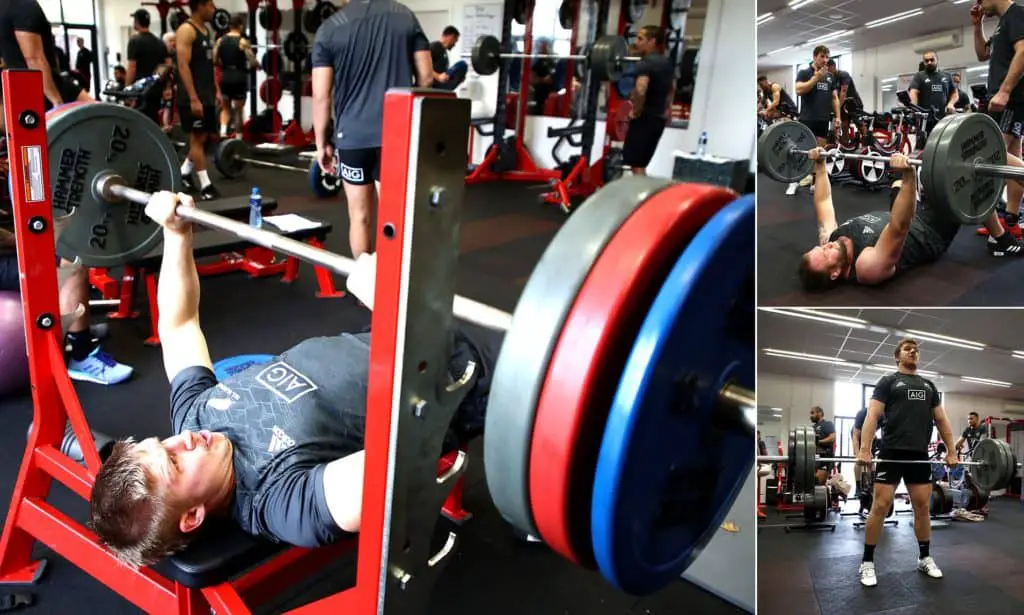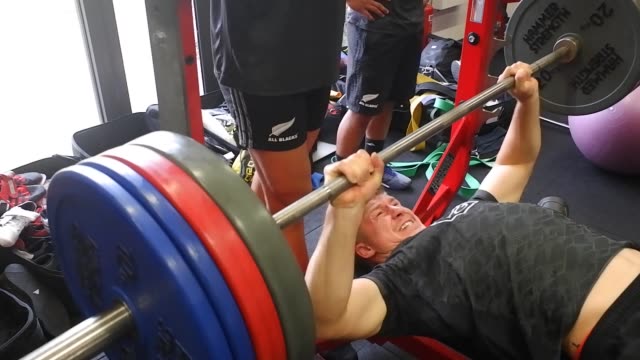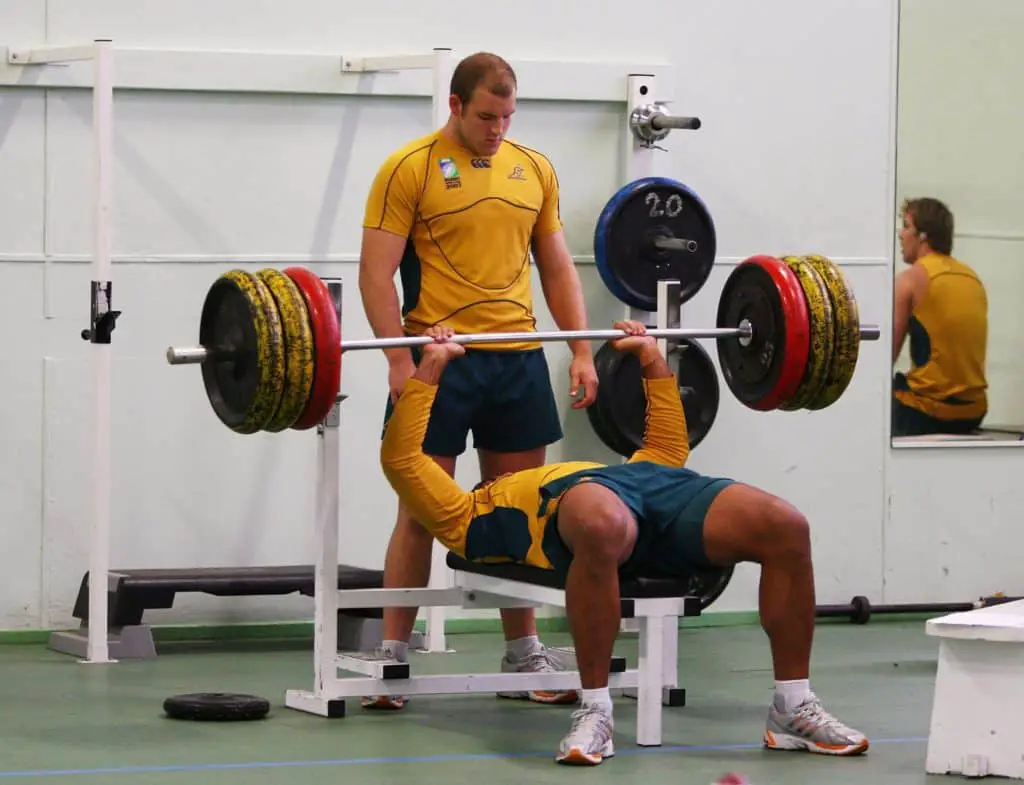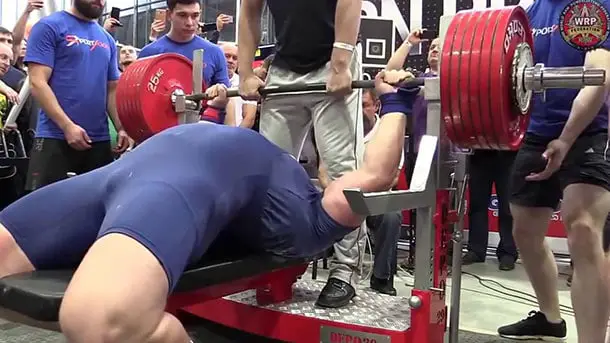
There is no doubt that rugby players need to be strong. Strength helps rugby players throw their opposition to the ground during tackles, bowl over the opposing side during the cleanout phase at the ruck and break the defensive line when going on rampaging runs.
Rugby players are always looking for new exercises that can help them increase their strength and on field performance. Today we will look at one of the most popular strength building exercises, the bench press and to determine its usefulness for rugby players.
Is bench press good for rugby players?
Even though the bench press is commonly performed by rugby players, its usefulness is limited and it is the least beneficial of the 3 powerlifting movements. Rugby players rarely use the upper body pushing motion trained by the bench press. Rugby players generate most of their power through the use of their legs which is why the squat is a much more effective movement.

The bench press is primarily a chest, shoulder and tricep movement. It is highly effective at developing an athlete’s chest strength building muscle in the shoulder and chest region.
The major problem with the bench press for rugby players is that during a rugby match chest strength is of limited usefulness and players rarely use an upper body pushing motion. The only time players extend their arms in a pushing motion is during a fend or stiff arm you could also argue this movement is more about timing and less about raw strength.
Scientific studies have shown the lack of correlation between the bench press and rugby performance. Speranza et al. (2016) tested the max bench press, squat and tackling power of Twenty-four professional rugby league players. The rugby athletes then performed an 8 weeks of strength regime as part of their preseason training before being retested.
The strength training resulted in large improvements to the players’ bench press and squat records. The improvement in squat performance correlated the strongest with tackling (r = 0.60; p < 0.01). The rugby players with the highest improvement in squat performance also recorded the highest improvement in tackling performance. However, improvements in bench press did not result in improved tackling performance at all.
Rugby is a game that requires much more lower body strength than upper body strength. Then why is the bench press so common among rugby players?

Rugby strength and conditioning coaches for the most part just follow the trends. Over the last 30 years the bench press has emerged as one of the most popular strength exercises around the world. With the increased popularity of powerlifting, where the bench press is one of the 3 competition lifts, the bench press has continued to find its way into rugby players’ strength programs.
However, just because a strength exercise is popular does not mean it is suitable for all athletes to perform. In rugby the lack of required chest strength and pushing motion makes the bench press largely ineffectual.
While rugby players should have balanced physiques and have no glaring weak points there is no reason for players to bench press regularly in an effort to build shoulder and chest muscle/strength. There are other exercises which are effective and safer.
If rugby players are looking to build shoulder strength the standing barbell press is a more effective movement than the bench press. Rugby players could also use the push press which has the added benefit of also training the quads and hips alongside the shoulders.
If rugby players are in need of some extra chest muscle they can perform incline dumbbell press or chest flies. Both of these exercises are superior to the bench press in stimulating the upper chest and generating muscle growth.
The other major problem with the bench press for rugby players is the risk of serious injury. The bench press is responsible for 1.35 injuries per 1000 hours. While this is low compared to rugby’s injury rate this is not evidence the movement is safe.

Rugby athletes who are already at high risk of injuries due to playing a high impact collision heavy contact sport should not be compounding their injury risk by performing strength exercises which can cause injury. Rugby athletes who need to develop upper body pushing strength should be looking for safer alternatives to the bench press such as dumbbell press, barbell press and push press.

The most common injuries suffered while benching are pec, labrum and rotator cuff tears which are serious injuries, requiring up to 6 months to recover from. Do you really want to lose your entire rugby season because you enjoy bench pressing? Other common bench press injuries include tendonitis in the elbows and shoulder and chest strains.
Rugby athletes should focus on performing supplementary exercises which have the most carryover to on field performance such as lower body exercises including squats, barbell jumps, plyometrics, jumping (broad jumps, tuck jumps, bounding) and sprinting.
While avoiding supplementary exercises which have little carryover to on field performance and also have a risk of injury such as the bench press.
The bench press is not a good exercise for rugby players to perform. Rugby players need to be strong but most of their power is generated through their legs. There is very little upper body pushing on the rugby field which is what the bench press primarily trains. Chest strength is also not very important during a rugby contest.
The bench press always carries significant injury risk (1.35 per 1000 hours) and is responsible for numerous serious injuries which can take 6 + months to recover from (shoulder and pec tears). The lack of carryover to on field performance and the high injury risk makes the bench press unsuitable for rugby players.
